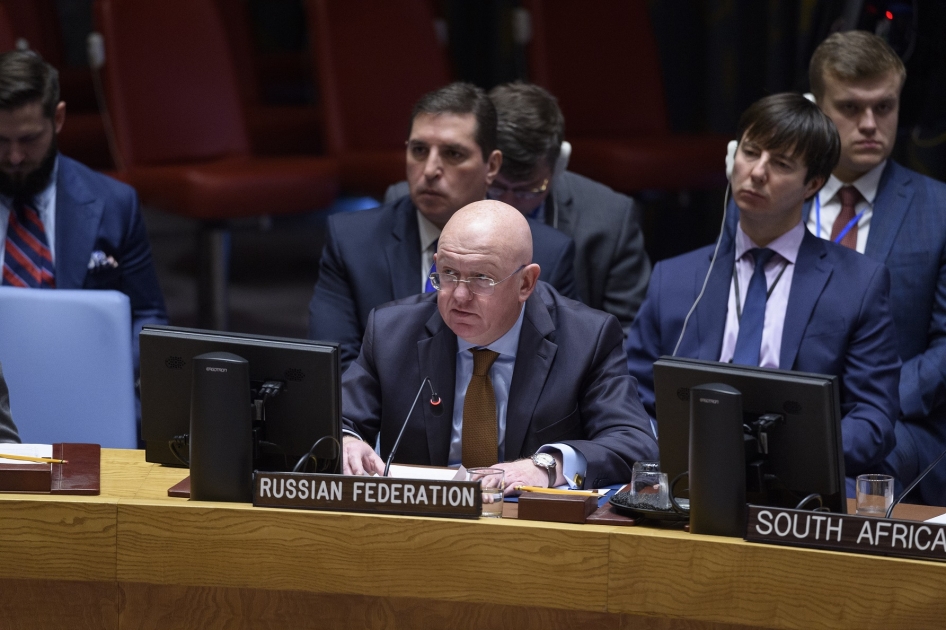Statement by Permanent Representative Vassily Nebenzia at a UN Security Council Meeting on the situation in Bosnia and Herzegovina
Mm. President,
We listened to the report of the High Representative very attentively. Once again, we have to say that the information we received as well as the report that has been circulated in the Security Council do not build either an objective or a well-balanced picture of the developments in the country. What shows itself here is pervasive bias to Bosnian Serbs and Croats, whose leaders the High Representative blames (without any good reason) for all difficulties that the country lives through. Besides, instead of facts we often come to hear proverbial “highly-likely-style” speculations.
The report mentions in passing one correct point: the key source of the majority of Bosnian problems is serious divergences in opinions of the three sides – Bosniaks, Serbs, and Croats regarding ways of further development of statehood of Bosnia and Herzegovina. Amidst such circumstances, efforts of the Office of the High Representative should focus on promotion of the culture of dialogue, provision of “good services” when needed in order to help Bosnians resolve all matters of argument.
Instead of this, the Office of the High Representative spends its time, energy, and resources to justify “Anti-Dayton” labels that have been pinned to the leaders of Bosnian Serbs and Croats. In this regard we cannot fail to mention that the current member of the Presidency of Bosnia and Herzegovina representing Serbs, M.Dodik, as well as Chair of the party “Croatian Democratic Union of Bosnia and Herzegovina” D.Čović on many occasions reiterated their commitment to the peace agreement, moreover, they prove this commitment in practical terms on a regular basis. It is vital to scrupulously stick to Dayton principles according to which the three state-constituting nations of BaH should be equal, and the two entities should have broad governance authorities. We should also be respectful to our Bosnian partners and maintain dialogue in a correct manner.
What raises concern is the report’s speculations about alleged backward developments with regard to implementation of the “Five Plus Two Plan” endorsed by the Steering Board of the Peace Implementation Council that enshrines terms of closure of the Office of the High Representative. While recognizing that the situation in the country is complicated, we still cannot share this assertion. Here we rather have to do with an aspiration to find any arguments in favor of keeping the international protectorate in BaH that has long become obsolete.
In this regard, we call upon our colleagues in the Security Council and in the Steering Board to galvanize action to close the Office. We have a vivid positive example – district Brčko of Bosnia and Herzegovina that has been functioning normally since 2012, when the Steering Board supported the decision to “freeze” the international supervision of this region.
We would like to draw attention to the imperative need of the High Representative to observe their mandate. Mr. Inzko is not authorized to do the lobbying in favor of European and Euro-Atlantic integration of Sarajevo, about which the report speaks a lot. We touched upon this issue many times.
The new Head of OSCE Mission in BaH also got down to it by organizing a workshop and advocating for soonest accession to NATO.
It might seem BaH has no other concerns rather than to become a NATO member. Ironically, the European agenda shifts to the backburner. Is it not obvious that the country lacks consensus on that issue? We believe it is unacceptable to ignore the principle of consensus decision-making by the Presidency of BaH with regard to foreign policy.
Let me say a few words about the work of independent international commissions established by the Government of the Republika Srpska to investigate crimes committed in 1991-1995 against representatives of all ethnicities in the area of Srebrenica and against Serbs in Sarajevo. We do not know why, but the High Representative nearly demonizes them. We proceed from the fact that these commissions were established because there had been some apparent drawbacks in the activities of the ICTY and its residual mechanism about which we repeatedly expressed our concerns. Conclusions of the commissions should shed light on a series of heinous war crimes that ICTY for some inexplicable reason has left without attention. We would like to avail of this opportunity to refer all members of the Council to a regular report of the Government of the Republika Srpska on the situation in BaH that contains facts that are worth considering about this and other relevant topics.
On our part, we will continue to do our best to ensure that Bosniaks, Serbs, and Croats approach all problems jointly, while being supported by the solid and well-balanced basis of the Dayton Agreement that stipulates equality of the three state-constituting nations. We stand ready to expand our mutually beneficial relations with BaH at all tracks of our shared interest. Corresponding commitments were made, in particular, by Prime Minister of the Russian Federation Dmitry Medvedev as he met with member of Presidency of Bosnia and Herzegovina Milorad Dodik in Belgrade on 19 October this year. We are open for mutually respectful cooperation with representatives of all political forces. We hope our joint work with Bosnians will promote post-conflict building, social and economic development and cultural diversity in Bosnia and Herzegovina and in the Balkans at large.
Thank you.
